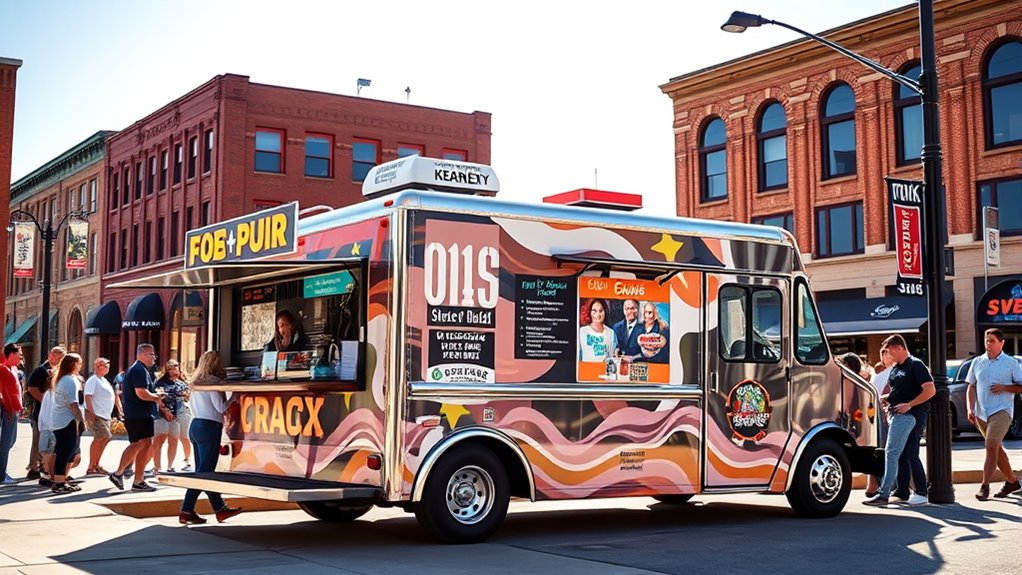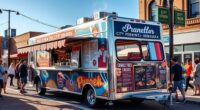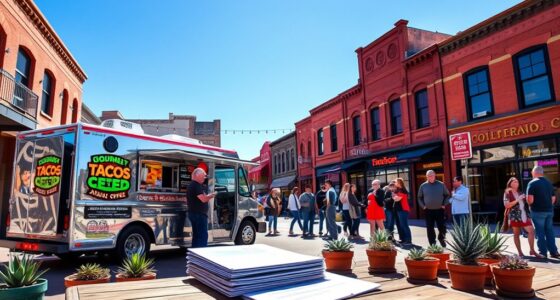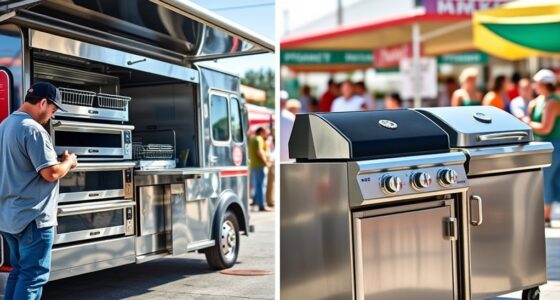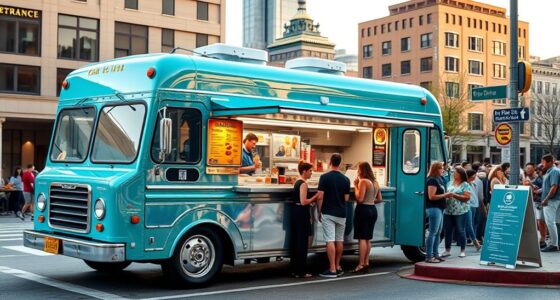To open a food truck in Kearney, Nebraska, you need to secure the Mobile Food Vendor Permit from the City Clerk and meet health, zoning, and parking regulations, including restricted operating zones like the MONA lot. Startup costs range from $30,000 to $85,000 for trucks, with annual permit fees around $79 and insurance about $2,000–$4,000. Focus on local favorites and utilize social media and events for marketing. Continue exploring to learn how to navigate permits, develop a compelling menu, and grow your presence.
Key Takeaways
- Obtain a Mobile Food Vendor Permit from the Kearney City Clerk and ensure compliance with Nebraska health standards and documentation requirements.
- Prepare an initial investment of $30,000–$85,000 for vehicles, permits, supplies, and ongoing expenses like insurance and maintenance.
- Operate in designated zones, mainly the MONA parking lot, with limited permits, and follow parking and zoning restrictions.
- Develop a menu blending regional favorites with local ingredients, and use social media and local events for marketing and customer engagement.
- Build community ties by participating in local festivals, showcasing Nebraska products, and maintaining consistent branding and compliance.
Navigating Permits and Licensing Requirements
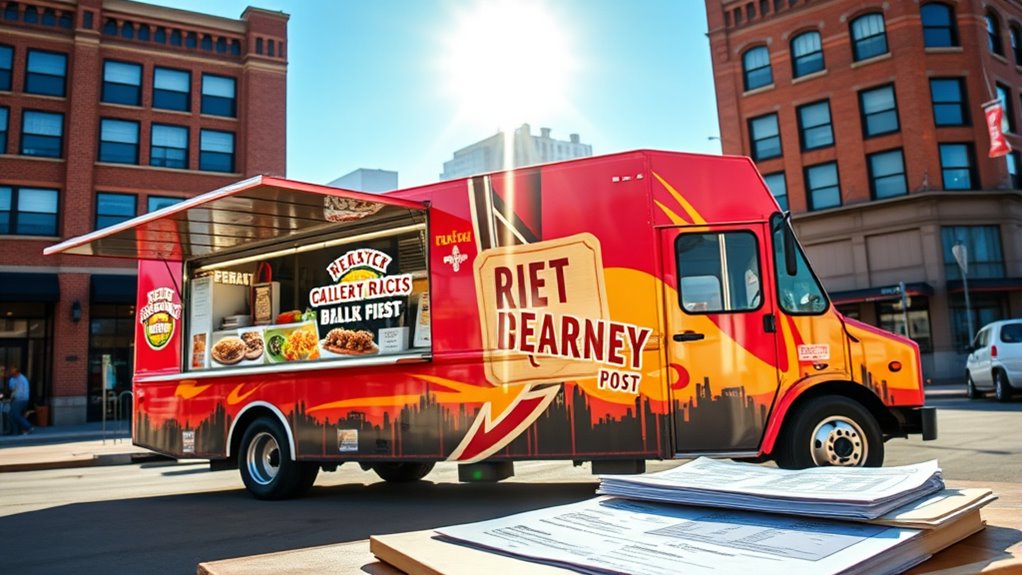
Managing permits and licensing requirements is essential for legally operating a food truck in Kearney. Starting January 1, 2025, all mobile food vendors must display a valid Mobile Food Vendor Permit during operations, which you apply for through the City Clerk—either by email or in person. You’ll need to submit documentation like your Nebraska Sales Tax Permit, Federal Tax ID, and state licenses. Operating without a valid permit is unlawful. Additionally, you must obtain a permit from the Nebraska Department of Agriculture, paying around $79.23 for the initial application and $39.60 for inspection, with annual renewals. You also need an Itinerant Merchant Registration Permit from the Kearney Police Department, costing $75 per day or $500 annually per individual. Failure to comply with these permits can result in fines or other enforcement actions. Compliance with both local and state permits is vital to avoid penalties.
Estimating Startup and Operating Expenses
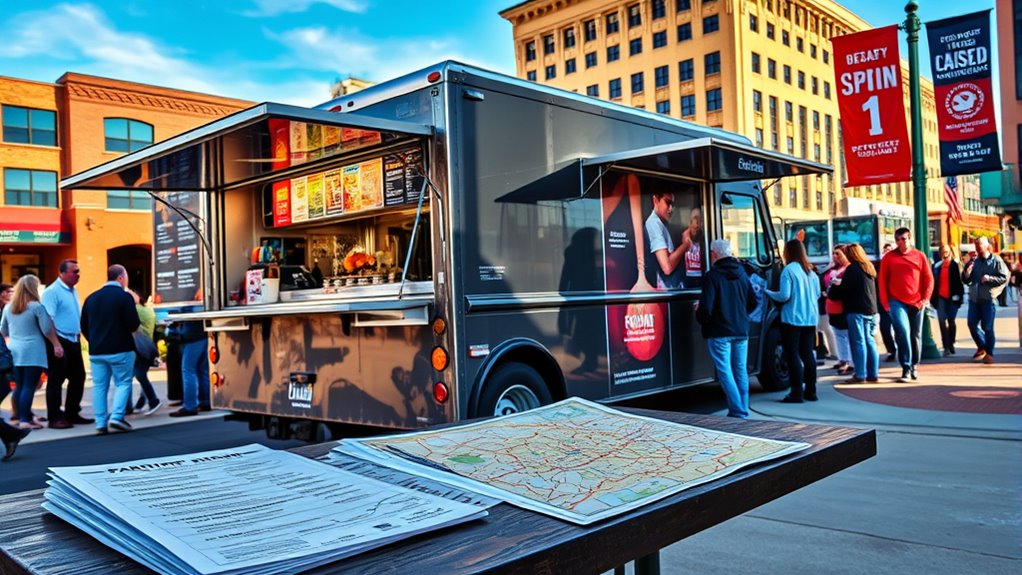
Understanding your startup and ongoing costs is essential for launching a food truck in Kearney. You’ll need to take into account initial vehicle and equipment expenses, as well as recurring operating costs like permits, fuel, and supplies. Planning carefully helps ensure your budget covers everything from the first dollar spent to day-to-day operations. Additionally, accounting for hidden costs such as waste disposal, maintenance, and insurance can prevent unexpected financial surprises as your business grows. Incorporating effective space and organization strategies can also help optimize your setup and reduce clutter-related expenses.
Initial Investment Breakdown
Starting your food truck venture in Kearney, Nebraska requires a clear estimate of both startup and ongoing expenses. Your initial investment includes several key costs:
- Vehicle and Equipment: Expect to spend between $30,000 and $85,000 for a used or custom-built truck, with additional equipment costs for grills, refrigerators, and appliances. New trailers can range from $50,000 to $100,000.
- Licensing and Permits: Budget around $500 to $2,000 for permits, including mobile vendor permits, event-specific licenses, and city taxes.
- Inventory and Supplies: Allocate $2,000 to $3,000 for initial food stock, containers, utensils, and specialty ingredients to ensure you’re ready for opening day. Proper equipment can significantly impact your operational efficiency and food quality.
Ongoing Operating Expenses
Estimating your ongoing operating expenses is essential to keep your food truck business in Kearney running smoothly and profitably. These costs include permits, fuel, maintenance, supplies, insurance, and marketing. Permit fees vary: Nebraska’s state permit costs about $79.23 annually, plus inspection fees around $40, while local inspection costs differ—ranging from $129 to over $500 per year. Fuel and maintenance typically range between $1,000 and $2,200 annually. Food supplies cost roughly $3,000 to $5,000 yearly, with additional expenses for waste disposal. Insurance premiums can reach $2,000 to $4,000 annually. Marketing and event permits add up, costing a few hundred dollars per year. Proper budgeting guarantees your food truck remains profitable and compliant. Additionally, understanding home improvement basics can help if you plan to upgrade or customize your truck or setup.
Identifying Prime Locations and Zoning Regulations
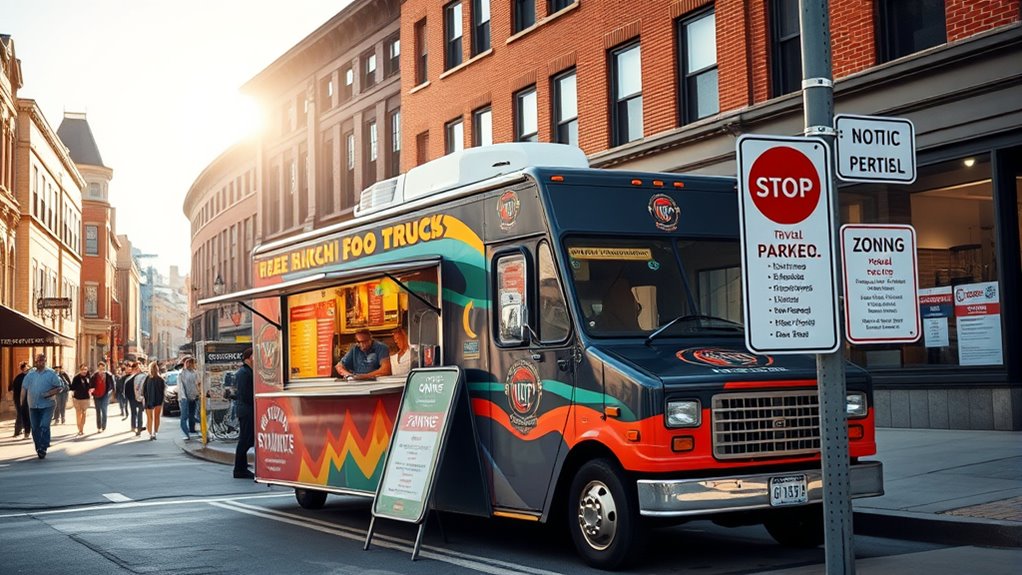
To find the best spots for your food truck, you need to understand designated operating zones and parking rules set by the city. Make sure you have the necessary permits and permissions, especially for private properties or special event areas. Remember, certain locations are off-limits or require exceptions, so staying compliant keeps your operation smooth and legal. Additionally, awareness of local regulations related to food truck operations, including weight limits and zoning restrictions, can help prevent potential legal issues.
Designated Operating Zones
In Kearney, Nebraska, food trucks are restricted to specific designated zones, primarily the public parking lot north of the Museum of Nebraska Arts (MONA). You can only park in stalls along the northernmost edge of this lot, limiting your location options. No other parking lots are approved unless during city or MONA events that take priority. The city issues only five annual permits at $100 each, and you must maintain insurance naming the city as an additional insured. Designated operating zones are critical for legal compliance and successful operations in the area.
Key points to contemplate:
- Food trucks operate only in the designated MONA parking lot unless during special events.
- Permits are limited, with strict requirements for insurance and compliance.
- Vending must not obstruct traffic or pedestrians, and approvals are needed for adjacent private property.
Parking Restrictions and Permits
Parking restrictions and permit requirements define where food trucks can operate legally in Kearney. To start, you’ll need a Food Truck Permit, costing $100 annually, with a limit of five permits per year. Permitted trucks may only park in designated stalls along the north side of the lot north of the Museum of Nebraska Arts (MONA). Parking outside this area in city-owned lots is prohibited. You must also carry liability insurance of $1 million, naming the city as an additional insured. During city or MONA events, parking is reserved, limiting your options. Starting January 1, 2025, you also need a Mobile Food Vendor Permit, obtained through the City Clerk’s office, with each unit requiring its own permit. Proper permits and insurance are essential for legal operation and compliance.
Prohibited Locations and Exceptions
Understanding where food trucks can operate in Kearney requires careful attention to zoning regulations and permitted locations. You must follow Kearney County zoning rules, which restrict food trucks in residential, agricultural, and certain recreational zones unless explicitly allowed. Internet Explorer 9 and below are incompatible with current web standards. Food trucks need a valid Mobile Food Vendor Permit; operating without one after January 1, 2025, is prohibited. Operating in “no food truck zones” or on federally or state-owned highways without permission isn’t allowed. Private property requires written consent from owners before parking or operating. Always confirm zoning rules and obtain necessary permits for your chosen location. Additionally, understanding security zone info can be helpful to ensure compliance with local regulations and proper safety practices when operating your food truck.
Crafting a Menu That Resonates With Local Tastes
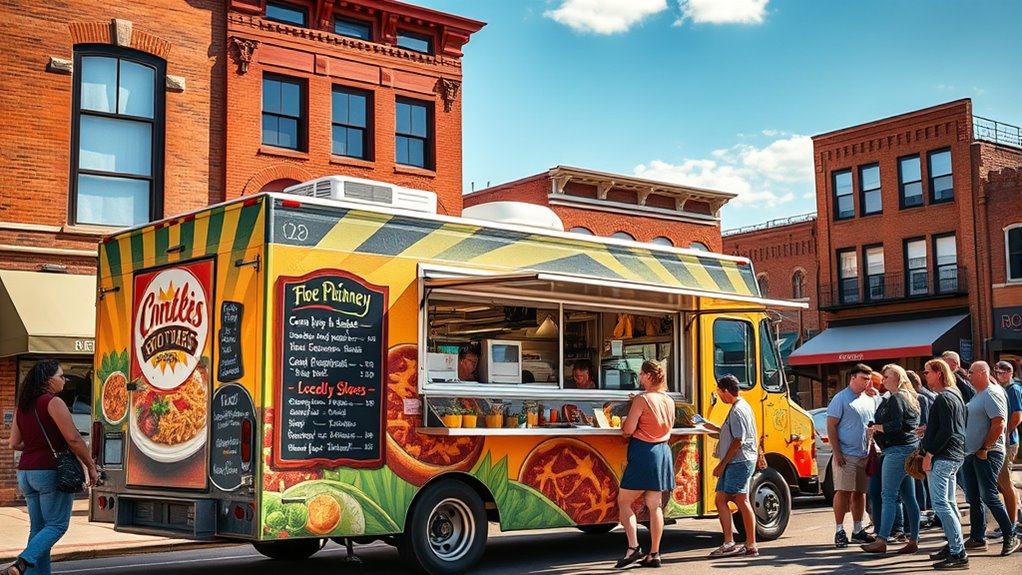
To create a menu that truly resonates with Kearney’s local tastes, focus on blending familiar comfort foods with innovative twists that elevate traditional favorites. Incorporate smoky BBQ flavors and hearty craft burgers to appeal to regional preferences. Highlight locally sourced ingredients like Nebraska beef and fresh produce to boost authenticity and community pride. Include homemade donuts and sweet treats that pair well with beverages, catering to casual dessert cravings. Balance classic items, such as smoked meats and burgers, with creative sides or signature toppings to attract foodies seeking unique experiences. Keep portion sizes generous for value, and consider seasonal specials to encourage repeat visits. Offering vegetarian options can also broaden your market. Design your menu for quick, easy handling, perfect for on-the-go eating. Additionally, integrating advanced techniques in food preparation can elevate your offerings and set your truck apart from competitors.
Effective Marketing Strategies to Attract Customers
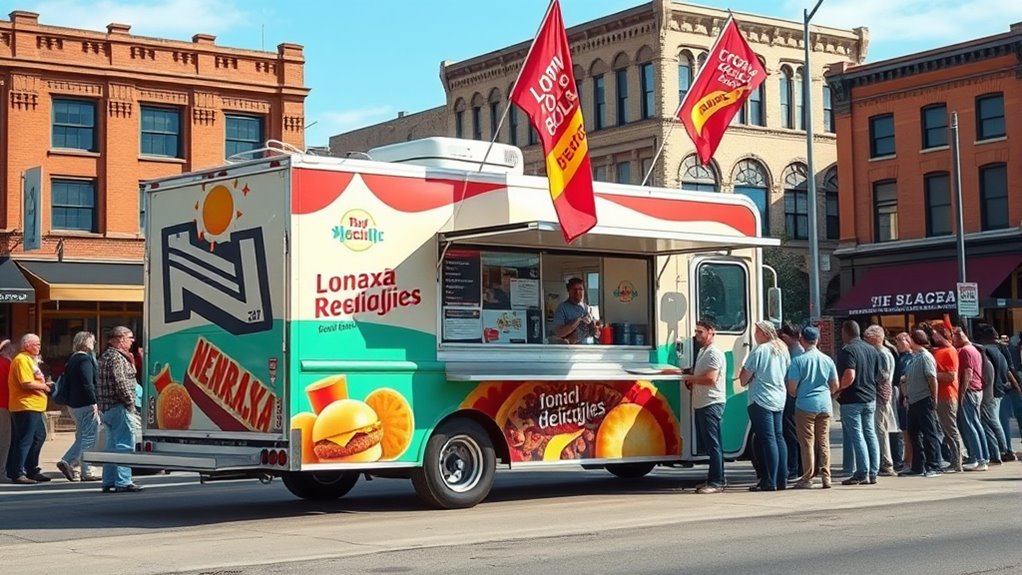
Effective marketing is key to attracting customers to your Kearney food truck and standing out in a competitive scene. You should leverage social media, participate in local events, and develop loyalty programs. Digital tools like GPS, analytics, and review platforms enable better customer targeting and feedback management. 1. Use social media platforms like Facebook, Instagram, TikTok, and Snapchat to promote menu updates, location changes, and specials. Engaging content can boost sales by 20% and increase customer spending by 15%. 2. Join local festivals and street fairs at least three times a year to build brand awareness, showcase specialty items, and foster community relationships. 3. Implement loyalty or rewards programs, such as punch cards or app-based incentives, which can increase repeat visits by 30%. Incorporating state-specific benefits and local investment opportunities can further enhance your marketing effectiveness and attract a dedicated customer base. Combine these strategies with targeted location-based promotions for maximum impact.
Ensuring Compliance and Maintaining Best Practices
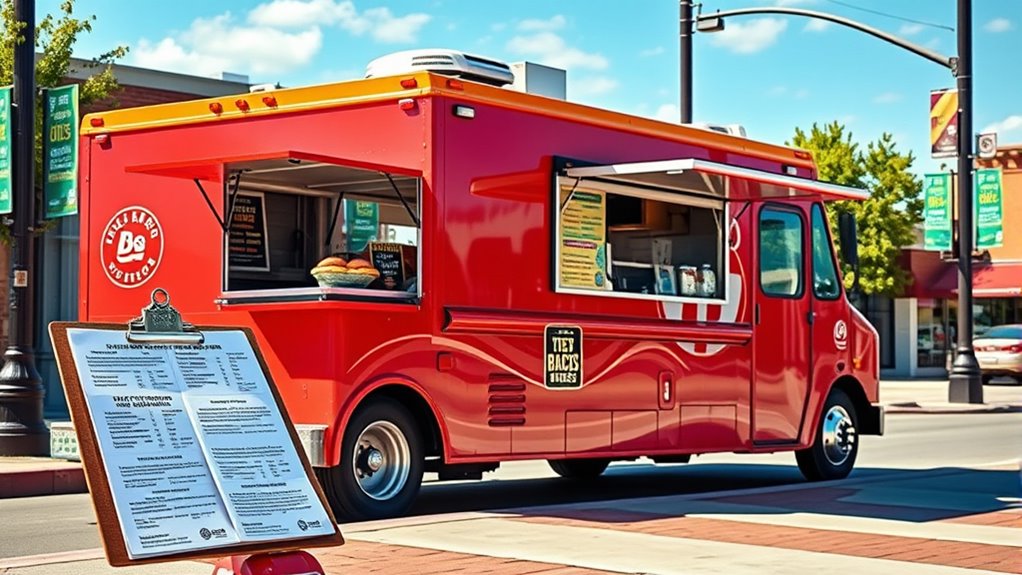
Ensuring compliance and maintaining best practices are essential for your food truck’s success in Kearney. You must obtain a Mobile Food Vendor Permit, display it prominently, and renew it annually by December 31. Your truck needs to stay mobile, operating only during designated hours and within permitted zones, with no use of city electrical hookups—generators are allowed if attached. Follow strict health standards under Nebraska law, including proper food handling, cleanliness, and waste disposal. Keep all permits and documentation accessible for inspections. Adhere to parking and zoning restrictions, avoiding prohibited activities like setting up stationary elements or obstructing traffic. Be aware that Eye Patch benefits, although unrelated to food truck operations, highlight the importance of consistent care to maintain optimal results. By consistently following these rules, you protect your license, reputation, and ensure your food truck remains a valued part of Kearney’s vibrant food scene.
Frequently Asked Questions
How Long Does the Permit Approval Process Typically Take in Kearney?
You’re wondering how long it takes to get your permit approved in Kearney. Usually, the process can take from a few days up to several weeks, depending on how complete your application is and if additional inspections are needed. Factors like verification, health and safety checks, and staff availability influence the timeline. To expedite things, guarantee your paperwork is thorough and all inspections are scheduled promptly.
Are There Any Restrictions on Operating Hours for Food Trucks?
You should know that there are specific restrictions on your food truck’s operating hours in Kearney. You’re allowed to operate between 11:00 a.m. and 2:00 p.m., then again from 4:00 p.m. to 1:00 a.m. daily. Keep in mind, city events may modify these hours, and you must park only during permitted times. Also, loudspeakers are prohibited, and you need a valid permit to operate within these timeframes.
Can I Operate a Food Truck Without a Permanent Location?
Yes, you can operate a food truck without a permanent location in Kearney. You’ll need to get a Mobile Food Vendor Permit from the city, which must be displayed during operations. Make sure your truck complies with local parking rules and is only at approved sites or events. Keep in mind, you’ll need separate permits for each vehicle and must meet state health regulations.
What Are the Insurance Requirements for Food Truck Owners in Kearney?
You need to meet specific insurance requirements to operate your food truck legally in Kearney. This includes maintaining at least $1 million in general liability coverage, with the city named as an additional insured. You also require commercial auto insurance meeting Nebraska’s minimums, plus optional coverage like equipment or cyber liability. Keep your certificates valid throughout your permit’s duration, and make certain your policy covers third-party injuries and property damage to stay compliant.
How Do I Renew My Permits Annually in Kearney?
To renew your permits annually in Kearney, start by updating your application with the City Clerk, either via email or in person, before January 1. Pay the non-refundable fee, including permit and inspection costs, and verify your valid permit is displayed while operating. Remember, each mobile food unit needs a separate state permit, which you renew through the Nebraska Department of Agriculture by August 1 to stay compliant.
Conclusion
Starting your food truck in Kearney is like planting a seed—you’ll need permits, a tasty menu, and smart marketing to help it grow. By understanding costs, zoning rules, and local tastes, you set the foundation for success. Stay compliant and adaptable, and your truck will become a beloved staple on the streets. With passion and planning, you’re ready to turn your food dreams into a flavorful reality that keeps customers coming back for more.
